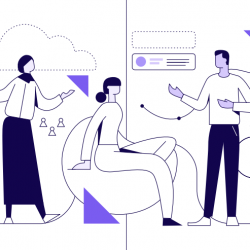To provide the best experiences, we use technologies like cookies to store and/or access device information. Consenting to these technologies will allow us to process data such as browsing behaviour or unique IDs on this site. Not consenting or withdrawing consent, may adversely affect certain features and functions.
The technical storage or access is strictly necessary for the legitimate purpose of enabling the use of a specific service explicitly requested by the subscriber or user, or for the sole purpose of carrying out the transmission of a communication over an electronic communications network.
The technical storage or access is necessary for the legitimate purpose of storing preferences that are not requested by the subscriber or user.
The technical storage or access that is used exclusively for statistical purposes.
The technical storage or access that is used exclusively for anonymous statistical purposes. Without a subpoena, voluntary compliance on the part of your Internet Service Provider, or additional records from a third party, information stored or retrieved for this purpose alone cannot usually be used to identify you.
The technical storage or access is required to create user profiles to send advertising, or to track the user on a website or across several websites for similar marketing purposes.
 The idea of the cargo cult derives from anthropological observations made about the behaviour of societies that encounter more technologically advanced societies. In particular it is rooted in those rituals and objects created by Pacific islanders in an attempt to attract modern goods and technology and generally earn favour with people who they thought could prevent terrible events. (more…)
The idea of the cargo cult derives from anthropological observations made about the behaviour of societies that encounter more technologically advanced societies. In particular it is rooted in those rituals and objects created by Pacific islanders in an attempt to attract modern goods and technology and generally earn favour with people who they thought could prevent terrible events. (more…)












 The events of the last 18 months have given us a once in a generation opportunity to reinvent work. Our generation can create a discontinuity between the assumptions of the past and the opportunities of the future. To capitalise on these opportunities though we have to dispense with the assumptions we hold about work and the places where work takes place, including many of the assumptions we hold about hybrid working. We have to re-examine the purpose of the office and what form it might conceivably take in the future before we can decide if it has any place in our plans.
The events of the last 18 months have given us a once in a generation opportunity to reinvent work. Our generation can create a discontinuity between the assumptions of the past and the opportunities of the future. To capitalise on these opportunities though we have to dispense with the assumptions we hold about work and the places where work takes place, including many of the assumptions we hold about hybrid working. We have to re-examine the purpose of the office and what form it might conceivably take in the future before we can decide if it has any place in our plans. 
 New research has highlighted concerns over the treatment of staff in the world of hybrid work. The
New research has highlighted concerns over the treatment of staff in the world of hybrid work. The 


 Employee experience has never been so high on the corporate agenda; with recent figures finding
Employee experience has never been so high on the corporate agenda; with recent figures finding 
 Young professionals and students have far greater concerns about the rise of remote work than their senior counterparts, according to a new report from
Young professionals and students have far greater concerns about the rise of remote work than their senior counterparts, according to a new report from 
 At this time of year, with events such as Happiness at Work Week and
At this time of year, with events such as Happiness at Work Week and 







April 25, 2022
The studied carelessness of agile workplaces
by Mark Eltringham • Comment, Workplace design